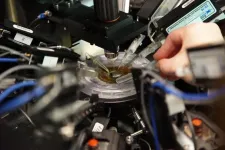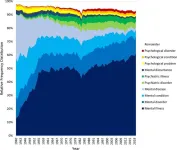(Press-News.org) INDIANAPOLIS – Patients with an intracerebral hemorrhage have better medical outcomes when surgeons perform an early minimally invasive removal of a hematoma compared to those receiving the standard of care, according to a study published in the New England Journal of Medicine.
Indiana University School of Medicine faculty clinicians Mitesh Shah, MD, Bradley Bohnstedt, MD, Regg Singh, MD and Jason Allen, MD, PhD are co-authors on a paper that assessed the findings of the ENRICH trial, a randomized clinical trial aimed at evaluating the effectiveness, safety and economics of the intervention of a minimally invasive neurosurgery technique.
The study found that patients with an intracerebral hemorrhage — a type of stroke caused by bleeding inside the brain — who had minimally invasive surgical evacuation of a brain blood clot and guideline-based medical management within 24 hours had better survival rates and functional outcomes at 180 days compared to patients who only received medical management.
Neurosurgeons used BrainPath and Myrid devices developed by the NICO Corporation, based out of Carmel, Indiana, to perform the surgery. Surgeons create a path to the site of bleeding by gently moving aside brain tissue. Once the BrainPath device was placed, an automated suction and resection tool — the Myrid device — was used to remove the hematoma in the brain.
“We can offer early clot removal in patients with an intracerebral hemorrhage and tell our patients that they have better outcomes and survival. The families of the patients can ultimately see patients leave the hospital sooner,” said Shah, chair of the Department of Neurological Surgery.
According to the World Stroke Organization, there are more than 3.4 million new intracerebral hemorrhages each year — and over 28% of all incident strokes are intracerebral hemorrhages. In the United States, more than half of patients die within 30 days of a hemorrhage.
The 300 patients in the ENRICH trial, set at 37 centers across the United States, either had a lobar (208 patients) or anterior basal ganglia hemorrhage (92 patients) with a hematoma volume of 30-80 mL and were randomized between the two surgical groups — surgery/medical management and medical management. IU School of Medicine and its health partner IU Health was one of the sites in the trial, where 14 patients received care.
Nearly three-fourths of the surgical group in the clinical trial saw the volume of their blood clot decrease to 15 mL or less after surgery was performed within 24 hours. At 30 days post-hemorrhage, 90.7% of surgery patients survived, while 82% of medical management patients survived.
“By evacuating the clot with this early intervention, we can increase survivability and reduce the number of days spent in critical care and reduce health care costs,” Bohnstedt said.
About IU School of Medicine
The IU School of Medicine is the largest medical school in the U.S. and is annually ranked among the top medical schools in the nation by U.S. News & World Report. The school offers high-quality medical education, access to leading medical research and rich campus life in nine Indiana cities, including rural and urban locations consistently recognized for livability. According to the Blue Ridge Institute for Medical Research, the IU School of Medicine ranks No. 13 in 2023 National Institutes of Health funding among all public medical schools in the country.
END
Intracerebral hemorrhage stroke outcomes improve with early minimally invasive surgery evaluated in clinical trial
2024-06-04
ELSE PRESS RELEASES FROM THIS DATE:
UC San Diego Health first in region to provide novel therapy for melanoma
2024-06-04
UC San Diego Health is the first hospital system in the region to offer a new immunotherapy treatment for metastatic melanoma. The personalized cellular therapy derived from tumor infiltrating lymphocytes (TIL), is the first solid tumor therapy on the market approved by the U.S. Food and Drug Administration (FDA).
“This one-time cellular immunotherapy is a powerful and robust tool to treat patients with advanced melanoma resistant to other approved therapies and who have limited treatment options,” said Gregory Daniels, MD, PhD, professor of ...
Zapping the right brain cells: The path to improved stimulation
2024-06-04
By Jake Siegel
SEATTLE, WASH.—June 4, 2024—New research by scientists at the Allen Institute’s Brain and Consciousness group and Cedars-Sinai offers an unprecedented look at how neurons respond to ES. Far from being uniform, different types of neurons showed distinct patterns of ‘syncing up’ with electrical fields. These patterns varied depending on the rate at which the ES was delivered.
The findings, published today in Neuron, could help doctors fine tune where, when, and how ...
How an Indian government policy backfired: the unintended consequences of price regulation of prescription drugs
2024-06-04
Researchers from Indian Institute of Management Calcutta, University of Chicago, and Management Development Institute, Gurgaon published a new Journal of Marketing study that examines the unintended consequences of an Indian government healthcare policy.
The study, forthcoming in the Journal of Marketing, is titled “Do No Harm? Unintended Consequences of Pharmaceutical Price Regulation in India” and is authored by Saravana Jaikumar, Pradeep K. Chintagunta, and Arvind Sahay.
In countries without universal health insurance or developed health care systems, governments try to make drugs affordable and accessible. For instance, ...
Exercising during pregnancy normalizes eating behaviors in offspring from obese mice
2024-06-04
Maternal obesity impacts the eating behaviors of offspring via long-term overexpression of the microRNA miR-505-5p, according to a study publishing June 4th in the open-access journal PLOS Biology by Laura Dearden and Susan Ozanne from the MRC Metabolic Diseases Unit, Institute of Metabolic Science, University of Cambridge, UK, and colleagues.
Previous studies in both humans and animal models have shown that the offspring of obese mothers have a higher risk of obesity and type 2 diabetes. While this relationship is likely the result of a complex relationship between genetics and environment, emerging ...
Managing mental health should be about more than mind
2024-06-04
Clinicians often default to treating mental health conditions with a variety of medication. This approach, however, largely ignores the role of environment, lifestyle, and social factors. Mental Health professionals must work toward a more holistic management picture, Sidarta Ribeiro, Ana Paula Pimentel, Paulo Amarante and colleagues at the Federal University of Rio Grande do Norte, Federal University of Rio de Janeiro and FIOCRUZ in Brazil argue in the new open-access journal PLOS Mental Health on June 4.
More people than ever are being diagnosed with mental health conditions—particularly children and young adults. The World Health Organization estimates that mental health ...
Signaling between brain regions altered in teenage internet addiction
2024-06-04
Max Chang and Irene Lee of University College London review neuroimaging studies of the effects of internet addiction on adolescent brains. Published June 4 in PLOS Mental Health, the study indicates that internet addiction is associated with disrupted signaling in the regions of the brain that are involved in multiple neural networks. These networks play an important role in controlling our attention, in association with intellectual ability, working memory, physical coordination, and emotional processing—all of which ...
In “mental illness” and “mental health”: how language around psychiatric conditions shifts
2024-06-04
A new survey of nearly 340,000 texts spanning 79 years shows that generic terms in mental health have shifted away from words like “disease” and “disturbance” and toward “psychiatric” and “mental health,” with “mental illness” becoming the most-used term. Nick Haslam and Naomi Baes at the University of Melbourne in Australia present these findings in the new open-access journal PLOS Mental Health on June 4.
The authors state that while words such as “crazy” and “lunatic” ...
Methods to quit smoking effective regardless of mental health history
2024-06-04
Sarah Jackson and colleagues from University College London and King’s College London branches of the SPECTRUM Consortium conducted a survey to study how mental health relates to methods people use to quit smoking, also known as smoking cessation aids. While the number of adults who smoke cigarettes has declined globally, people with mental health conditions are more likely to smoke and to do so more heavily. Because of these differences in tobacco use, the researchers theorized that the effectiveness of smoking cessation aids may be altered in individuals with a mental health condition. However, in their ...
Lived experience should be centered in future mental health research, say people with mental health conditions and their families and carers in nationwide Australian survey
2024-06-04
Lived experience should be centered in future mental health research, say people with mental health conditions and their families and carers in nationwide Australian survey.
####
Article URL: https://journals.plos.org/mentalhealth/article?id=10.1371/journal.pmen.0000010
Article Title: Experience is central and connections matter: A Leximancer analysis of the research priorities of people with lived experience of mental health issues in Australia
Author Countries: Australia
Funding: The ALIVE National Centre for Mental Health Research Translation is supported by a grant from the National Health and Medical Research Council (GNT2002047) ...
Internet addiction affects the behavior and development of adolescents
2024-06-04
Adolescents with an internet addiction undergo changes in the brain that could lead to additional addictive behaviour and tendencies, finds a new study by UCL researchers.
The findings, published in PLOS Mental Health, reviewed 12 articles involving 237 young people aged 10-19 with a formal diagnosis of internet addiction between 2013 and 2023.
Internet addiction has been defined as a person’s inability to resist the urge to use the internet, negatively impacting their psychological wellbeing, as well as their social, academic and professional lives.
The studies used functional magnetic resonance imaging (fMRI) to inspect the functional connectivity (how regions of ...





